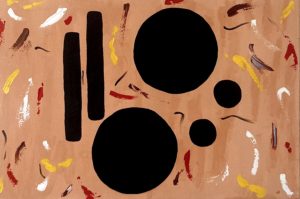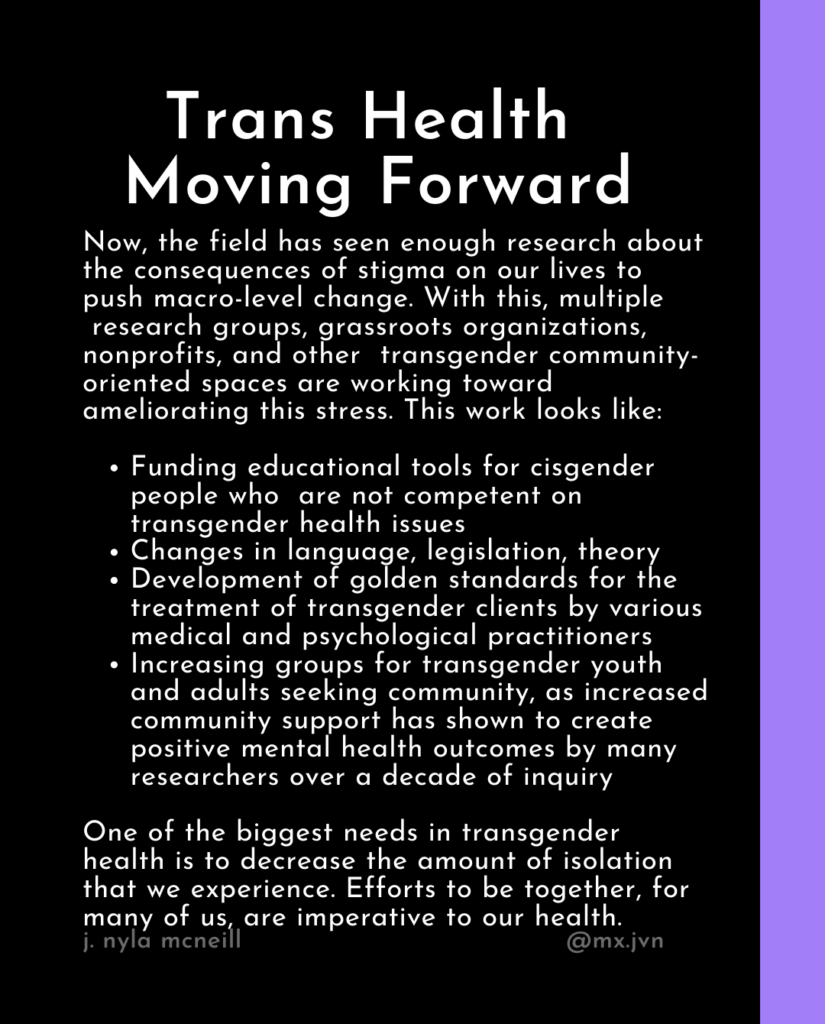Trans Day of I’ve Had Enough: I Am So Tired of Writing About Trans Suffering Within Institutional Settings
11 minute readFrom the Editors: Born and raised in Long Beach, contributor j. nyla mcneill (they/them) is a published psychological research scientist and multidisciplinary artist who has spent the past several years focused on “safer futures” for the demographic that is lowest on the life expectancy spectrum: the transgender community. In this piece mcneill expresses their exhaustion with being immersed in suffering. (Additional information on mcneill and their work is included after their perspective piece.)
On our last Trans Day of Visibility, I wrote something tragic about how subpar my career has been as a scientist who studies trans health… all the usual jazz about being underpaid compared to tenured or non-independent colleagues, not being respected, and my name being spelled or styled incorrectly often…
and I deleted it.
I’m tired of writing about it. I’m over it.
The more salient issue is that I’m so tired of writing and working about trans suffering.
Cannonballing myself toward joy isn’t just the answer, either.
It’s nuance time. It’s fantasy time. It’s write-about-anything-under-the-sun time.
It’s time for me to write literally anything else, and not just toward changing the way society works.
Who knows, writing for me may do that, too.

In all seriousness, I am so fed up about the last six years of my life when it comes to what I had to endure during publishing: what felt like consistently writing toward “proving” our oppression.
I was contributing to naming what we’re up against (in the literal sense that I wrote in an institutionally published issue about moving from “transphobia” to “cisheterosexism”), to the culture of navigating transness in multiple fields… from reciting poetry to packed rooms and theaters, to supporting the launch of the world’s largest BIPOC psychotherapy study, I’ve moved a whole lot of mountains writing about suffering while trans, but I’m truly over it.
It’s too much on my body and nervous system, and it was never supposed to be my way.
I’m moving toward something different.
I’m still going to write, but not in the capacity that is extractive of my existence. The things I am writing now (mostly music) are silly, frivolous, sexy, and just so happen to be written by a trans person.
Tomisin Oluwole
Dine with Me, 2022
Acrylic on canvas
36 x 24 inches
Click here to check out our interview with Tomisin Oluwole, a literary and visual artist based in Long Beach.

Instead of gunking up our site with ads, we use this space to display and promote the work of local artists.
I can’t write about transness at large any longer.
I’m BLESSED to have my flowers, but I mourn each day in this separation from what I was trained to do in the last decade.
I’m definitely blessed that I have the privilege to move on.
I’m especially excited for things to be more simple and creative in my life, and especially for my work with my crowd-funded-and-founded brainchild of a business at Mx. Lifestyling.
I have a lot of unfavorable feelings about Trans Day of Visibility because of extreme stress, grief, loss, etc., but…
It’s these days that remind me that I can love and advance the work for me, for us, and not the entire society, because the entire society ain’t living for us, or for me.
The world needs people like me prioritizing themselves, joy, rest, and pleasure.

person today,” mcneill says. Photo by Santiago Charbonneau.
More about j. nyla mcneill…
After a less than satisfactory experience in a university STEM program designed for marginalized students, j. nyla mcneill realized that “a lot of the sciences were designed to prey on me and prey on my ancestors. Being in anthropology and psychology, two of the most predatory fields that we’ve had in our country’s history of imperialism, it was just really uncomfortable… and the further I got into psychology, the more I recognized that the beginnings of the field were about discipline and control and not about health care and mental health.”
After graduation, instead of applying for a PhD program as they originally intended, they retreated from academia. What they were looking for didn’t exist and their university experience had left them feeling unhealthy on multiple levels. Instead they focused on tapping into their other skills as a musician, poet, and actor and had a brief foray into Hollywood. In 2020,mcneill joined the Eastern Sierras Conservation Corps. They became a proponent of Indigenous wisdoms, earth stewardship, and mutual aid. Eventually they had an epiphany that psychological healing did not have to occur in cold clinical settings. They did not have to be enrolled in an institution or sit behind a desk for the rest of their lives disconnected from nature to be a scientist.

Through a DIY PhD process with the online Bay Area-based School for the Ecocene, they were able to design an autonomous academic experience for themselves in community with a supportive cohort that included founder Sarita Doughtery. In an Instagram call-out for new PhD applicants, Doughtery explains the origin of the School of the Ecocene, “The Earth needs new models of learning that integrate and honor our intuition, ancestral knowledges, and cycles as valid, legitimate, and valuable!”
Along with raising thousands of dollars through mutual aid and the website Patreon, mcneill planned for the DIY PhD by asking themselves, “Okay, who are the people that I can be around, the people I can depend upon for sustainability and liberation studies, activism, communication, and mindfulness, [which are] all these things that I’m really drawn to, that I see that work in the world and work for all of us?”

Their program culminated with the founding and launch of their own consulting and coaching practice, Mx. Lifestyling. Intent on coaching others toward healing psychologically and holistically outside of clinical institutions, mcneill’s “overarching goal [is] to build a more creative, restful, and inclusive future…typically serv[ing] neurodivergent people, students, and those looking to integrate medicine and/or rest into their life and work.”
Doughtery, mcneill, and six fellow stewards now share co-operative ownership of the School. mcneill is also an at-large member of the Youth Advisory Board, a council held by the Office of Youth Development in Long Beach.

For more on their work, a full curriculum vitae with publications and presentations can be found on their website. You can also find them quoted in Discover Magazine’s January 2023 State of Science issue in an article titled “Gender-Affirming Care Tied to Improved Mental Care” by Helen Santoro. An Outside Magazine podcast interview titled “J. Nyla McNeill Finds Connection in the Wild” aired Feb. 23, 2023.


 inkcrowcall@substack.com
inkcrowcall@substack.com




